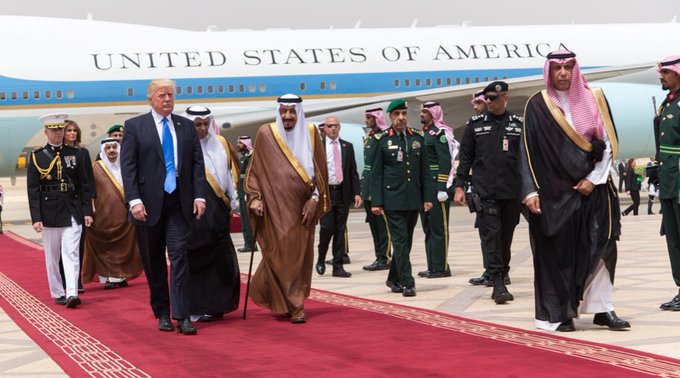RIYADH, SAUDI ARABIA — Saudi Arabian King Salman bin Abdulaziz and U.S. President Donald Trump signed nearly $110 billion in agreements Saturday to bolster the military capabilities of Saudi Arabia.
“This package of defense equipment and services support the long-term security of Saudi Arabia and the Gulf region in the face of Iranian threats, while also bolstering the Kingdom’s ability to contribute to counter terrorism operations across the region, reducing the burden on the U.S. military to conduct those operations,” the White House said in a statement.
The White House added that the agreement will create new opportunities for U.S. companies in the Middle East region and support “tens of thousands” of new jobs in the U.S. defense industry.
Included in the deal is a $6-billion pledge to assemble 150 Lockheed Martin Blackhawk helicopters in Saudi Arabia, which is expected to result in the creation of 450 jobs in Saudi Arabia.
Earlier Saturday, King Salman presented President Trump with the kingdom’s highest civilian honor during a meeting at the Royal Court in the Saudi capital of Riyadh.
After Trump and others entered the court to the music of bagpipes, King Salman decorated him with the gold King Abdulaziz al-Saud Medal.
Trump arrived in Riyadh Saturday to begin his first foreign trip as president.
The president and his wife, Melania, were greeted at the airport by King Salman. The king and the Trumps walked along the red carpet into the Royal Hall, a terminal at the airport, where they talked briefly. Minutes later, the Trumps, along with the Saudi king departed the airport in a motorcade, heading to the city along a route with deserted streets.Unprecedented destination
Heavy security was evident at the airport, including military vehicles with weapons.
Saudi Arabia is an unprecedented destination for an initial overseas visit by any U.S. president. Trump is making it his first stop on his first presidential foreign journey.
It is all the more surprising in the wake of his “America First” rhetoric and campaign statements calling for a “Muslim ban” backed by subsequent orders attempting to limit travel on six Muslim-majority countries.
Saudi Arabia, which has deep, long-standing energy and defense ties to the United States, was not named in the travel bans.
Indonesian President Joko Widodo confirmed Friday he will attend the meeting. An Indonesian government spokesman said, “We see this as an important meeting because it is the first time a meeting between the new American government and Islamic countries addressing issues that are of concern to us all, especially regarding the fight against radicalism and terrorism.”
Trip’s focus
President Trump, confronted by growing political scandals at home, intends to use the visit to portray his administration as a global leader by helping birth an alliance with like-minded Muslim leaders to combat “radical Islamic terrorism” (Trump’s phrase and one the Saudis do not want to use).
“It lays to rest the notion that America is anti-Muslim,” Saudi Foreign Minister Adel al-Jubair told reporters earlier this month.
“It’s very important that the president is reaching out to Muslim-majority countries in the world, and trying to identify who our friends are and work with them to beat our common enemies,” Democratic Congressman Thomas Suozzi, a member of the House Foreign Affairs Subcommittee on the Middle East told VOA.
“We have to recognize that most of the Muslims in the world are peace-loving people, who have strong faith and want to have a harmonious world we need to embrace,” he said.
A shared vision, with the Gulf Cooperation Council and Organization of Islamic Cooperation, to enhance the battle against the so-called Islamic State group and al-Qaida, also would be interpreted as putting Trump squarely on one side of the Sunni-Shi’ite ideological schism in the Muslim world.
The Saudis are Sunnis (Islam’s majority), while Iran is dominated by Shias.
Conflicts in region
Saudi Arabia and Iran support rival proxy forces in conflicts throughout the region, including in the two significant civil wars in Yemen and in Syria, where the embattled forces of President Bashar al-Assad are backed by Tehran and Moscow.
“Going to Riyadh is a big symbolic gesture to Iran,” Mike Pregent, a Hudson Institute adjunct fellow, told VOA.
The Middle East analyst adds that the attempt to forge new alliances among anti-Iran regional powers is occurring because “the biggest threat they see after ISIS [Islamic State] is Iran and ISIS never goes away because of Iran.”
While administration officials say Trump is a strong believer in human rights, they acknowledge this will not be a significant topic of discussion here.
That angers some.
“If countering violent extremism is a priority for this administration and it wants to defang this ideology, then Saudi Arabia is a very odd partner for that project,” Sarah Leah Watson, Human Rights Watch Middle East Executive Director, told VOA. “The Saudi government and its policies are among the biggest sources of violent extremism.”
To demonstrate their earnestness for an even closer alliance with Washington, the Saudis are hosting a social media forum where Trump is to deliver a speech Sunday to the Muslim world.
In addition, the Saudis are organizing a counterterrorism conference, opening a center to “fight radical thought,” and predicting that some significant business deals will be signed at a forum for chief executives.
Source – VOA
